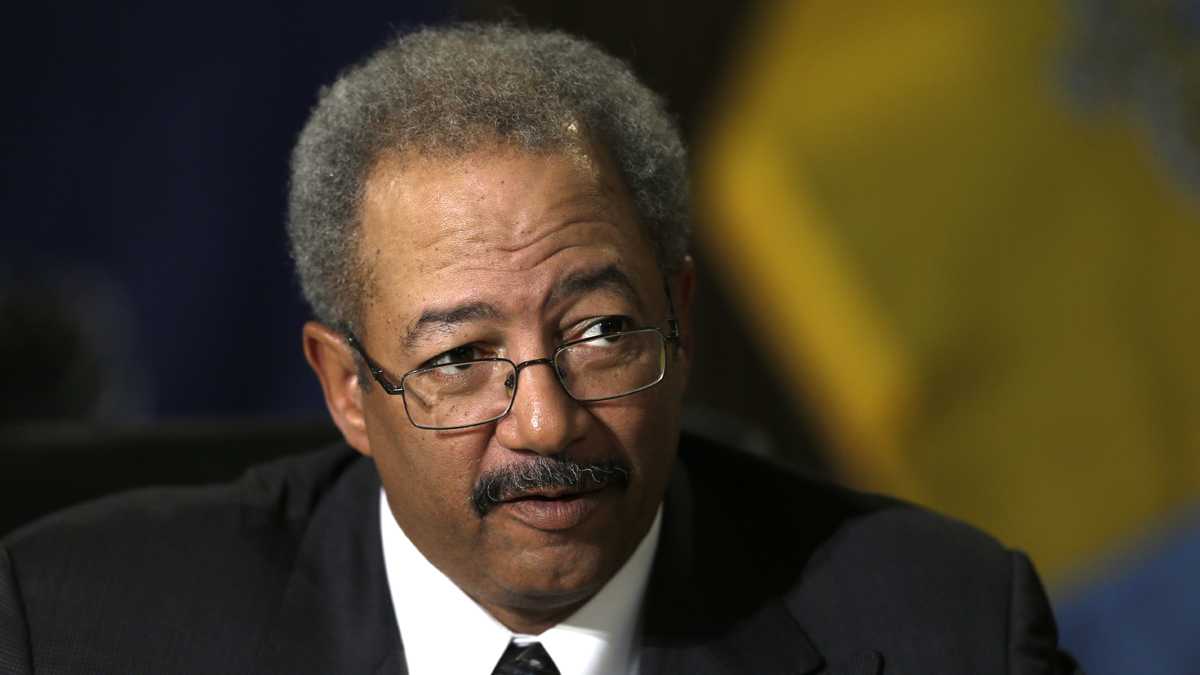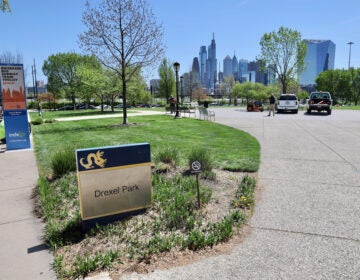A decade in prison for Fattah [updated]
Listen
(AP file photo)
A federal judge has sentenced former U.S. Rep. Chaka Fattah to 10 years in prison for stealing hundreds of thousands in public funds to repay an illegal campaign loan, accepting bribes from a wealthy friend, and using campaign cash to help pay off some of his son’s college tuition debt.
A jury also found that the 11-term lawmaker pushed to create a sham environmental nonprofit to settle a campaign debt he had with a political consultant.
Fattah — who, along with his co-defendants, was also ordered to pay more than $600,000 in restitution — plans to file an appeal. He is scheduled to turn himself into authorities on Jan. 25.
Before being sentenced, the 60-year-old calmly told U.S. District Judge Harvey Bartle III that he personally regretted decisions that he made.
“I want to make it clear to the court that I personally regret them,” said Fattah. He added that he was proud of his work in Congress and the “millions” of people it has helped over the past two decades.
Bartle said it was Fattah’s job as a member of Congress to “do good works” and called his crimes “astonishing.”
“Life, Mr. Fattah, is full of choices,” said Bartle. “You made some very bad choices.”
Sentencing begins for co-defendants
The four co-defendants convicted alongside Fattah will all be sentenced by the end of the week.
Herbert Vederman, a former deputy mayor of Philadelphia, was handed a two-year prison sentence and a $50,000 fine late Monday afternoon for bribery, money laundering and related offenses.
His lawyers asked Bartle in court to consider no jail time and 1,000 hours of community service for their client, who said he was “devastated and humiliated” by his crimes.
“I made bad decisions,” said Vederman following testimony from nearly a dozen character witnesses, including former Philadelphia Mayor Ed Rendell. “I was careless with the public’s trust.”
Fattah’s sentence was far less than what prosecutors sought for the former congressman, who resigned from his seat in June after losing April’s Democratic primary to state Rep. Dwight Evans.
In a sentencing memo filed last week, the government asked Bartle to give Fattah 17-22 years behind bars for leading a “wide-ranging public corruption.”
“Despite the advantages of his career and education, Fattah chose to violate the trust of his constituents and the taxpayers to line his pockets and advance his personal and political goals at their expense,” wrote Special U.S. Assistant District Attorney Eric Gibson.
During Monday’s hearing, Gibson added that Fattah’s crimes were particularly shocking given his time in public life and the negative impact political corruption can have on voters and other democratic institutions.
“That 37-year career, he knew. He knew exactly what he was doing,” said Gibson.
In its response, Fattah’s team of attorneys called the government’s recommendation “unnecessarily harsh,” saying their client deserved less time given the good he did during his two-decade career.
Focusing on years of service
The 75-page document highlights Fattah’s efforts around education, crime prevention and neuroscience research while in Congress, but also accomplishments from his life before he became an elected official.
“The picture painted by the government of Chaka Fattah Sr. at trial and in their sentencing memorandum is grossly incomplete. While it is true that Chaka Fattah now stands before this court convicted of serious crimes, he is also a man that has dedicated his entire life to the service of others,” wrote defense attorney Mark Lee.
In addition, Fattah’s lawyers argued that other politicians convicted of corruption have received shorter jail terms than the government sought. The 17-man list includes former Pennsylvania state Sen. Vincent Fumo and former Philadelphia City Councilman Richard Mariano.
Fumo got five years, Mariano 6 1/2.
During Fattah’s monthlong trial, prosecutors painstakingly detailed an often dizzying “white-collar crime spree” covering a series of schemes.
They called FBI agents, accountants, former congressional staffers, grant officers, and elected officials to help them make their case to jurors.
$1 million loan at center of corruption
At the heart of it, was an illegal $1 million loan Fattah took while running for Philadelphia mayor in 2007 — the race that ultimately put Michael Nutter in office.
A jury found that Fattah, with help from his co-defendants, stole $600,000 to help repay part of the loan, which came courtesy of a wealthy executive at college-loan giant Sallie Mae.
Prosecutors said the money — some of it taxpayer dollars, some of it charitable donations — was funneled through the Education Advancement Alliance, a nonprofit Fattah founded, and Solutions for Progress, a for-profit company started by Fattah co-defendant Robert Brand, with the help of fake documents and doctored bookkeeping.
In another scheme, Vederman gave Fattah nearly $30,000 over a period of years in exchange for Fattah’s efforts to help him secure a U.S ambassadorship under the Obama administration.
Prosecutors alleged that Vederman “showered” Fattah with gifts and money, including $18,000 to help pay for a vacation home in the Poconos. They said Fattah, in turn, lobbied Pennsylvania U.S. Sen. Bob Casey and members of the Obama administration by sending them letters extolling Vederman’s resume.
Vederman never got the ambassadorship.
Fattah was also convicted of using campaign funds to make tuition and student loan payments for his son Chaka “Chip” Fattah Jr.
Veteran political operative and Fattah co-defendant Gregory Naylor testified he made the payments, then Fattah reimbursed him. To cover it up, phony tax documents were created to make it appear that the younger Fattah had earned the money by working for Naylor’s firm.
Naylor pleaded guilty to concealment of a felony, knowingly falsifying records, and making false statements to the FBI in 2014. He was sentenced to probation in August.
Thomas Lindenfeld, a high-profile campaign strategist, also got probation after pleading guilty to one count of wire fraud, also in 2014.
On the stand, both provided critical testimony at trial, particularly about the illegal $1 million loan from 2007. Lindenfeld detailed some of the logistics. Naylor told jurors that Fattah knew all about it.
During their case, Fattah’s lawyers argued that Fattah had nothing to do with any of the government’s allegations. They said Naylor and Lindenfeld were the ones pulling the strings.
Part of their proof: Fattah’s name or signature couldn’t be found on any documents.
But after 14 hours of deliberation, a jury found Fattah guilty of racketeering conspiracy, bribery, money laundering, bank fraud and other offenses.
Also convicted were Bonnie Bowser, a former chief of staff at Fattah’s congressional office in Philadelphia; Karen Nicholas, a former congressional staffer and CEO of the Educational Advancement Alliance, a non-profit Fattah founded.
Nicholas is accused of obtaining a $50,000 federal grant for an already-held education conference, then using the cash on herself and Naylor.
The government is seeking far shorter sentences for all of Fattah’s co-defendants.
Nicholas and Brand will learn their fates Tuesday. Bowser’s sentencing hearing is set for Wednesday.
WHYY is your source for fact-based, in-depth journalism and information. As a nonprofit organization, we rely on financial support from readers like you. Please give today.





